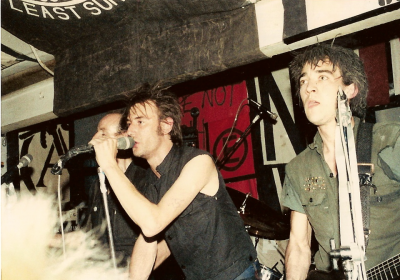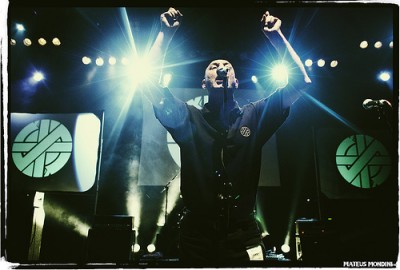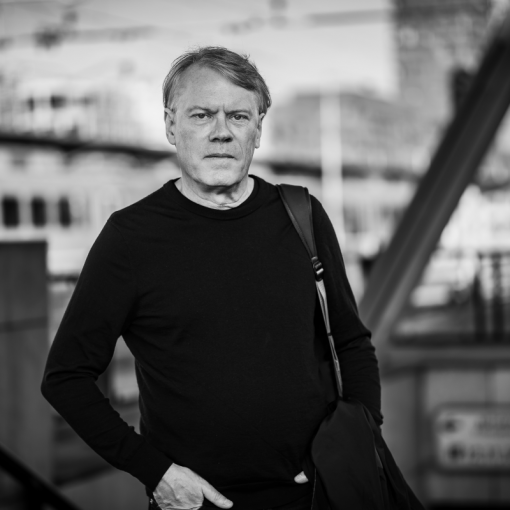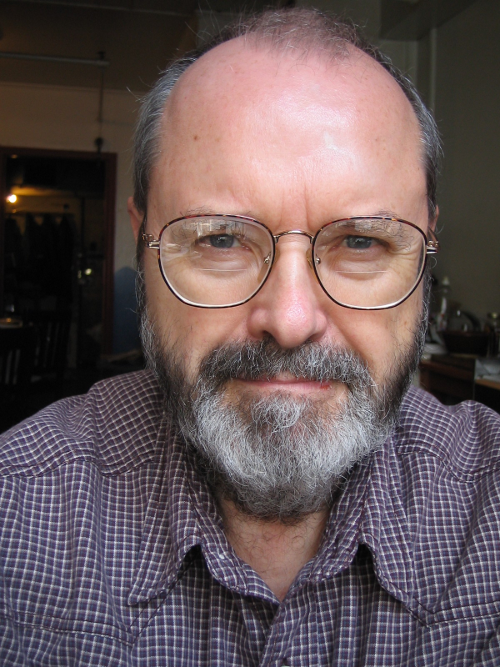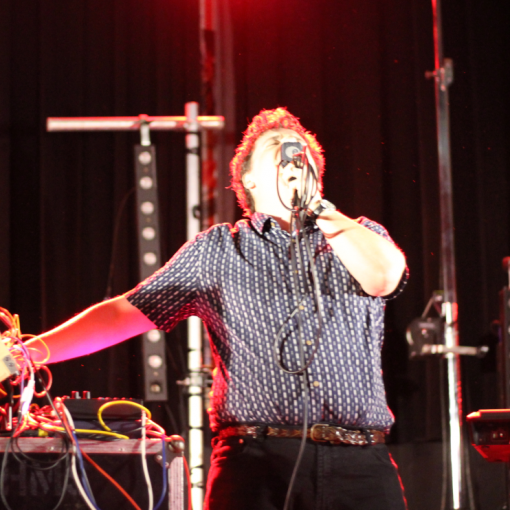Freq talks to Steve Ignorant of CRASS
To a young mind searching for meaningful music in the early 1980s, encountering CRASS for the first time was a frightening proposition. In those hazy, far-off days, when the Californian IT development nerds responsible for YouTube and Google had barely finished breastfeeding and the ZX Spectrum was the hot shit in cutting edge computer technology, one really couldn’t be entirely sure whether CRASS was a Punk band, a twisted Dadaist subversion, a political movement or some kind of terrorist cell, like the Baader-Meinhof Group fallen to earth in Ongar Great Park. Or, come to that, all four. With no promotional images to refer to (part of a carefully cultivated tactic to avoid the usual characterisation of a ‘band’ with ‘leaders’), one was confronted only by the CRASS monolith, an Anarchist juggernaut characterised by a terrifyingly intense sound, Gee Vaucher’s stark and unsettling black and white visual aesthetic, and a political edge so serrated that it felt as though it might rip open your windpipe if you got too close. At the time, with the political left as ragged as the lapels of Michael’s Foot’s donkey jacket, it often felt as though CRASS alone were seriously challenging the legitimacy of the Thatcherite consensus then gripping Britain in its iron (lady) embrace.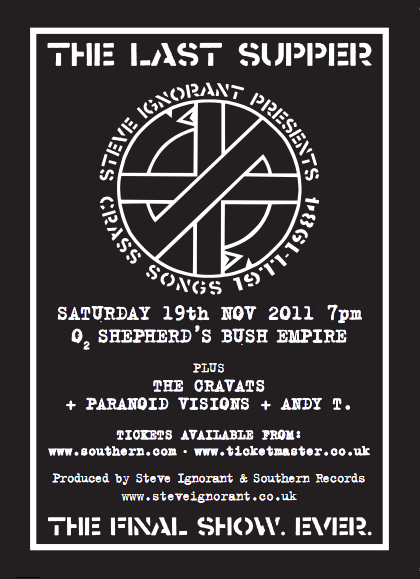 After having fought the state tooth and nail between their formation in 1977 and the eventual cessation of operations in 1984, CRASS’s legacy – though always as far removed from the mainstream as Herman Nitsch at a Board meeting of the Linda McCartney sausage company – continued to grow in terms of both breadth and depth of importance, and of geographic spread: whole generations of Punks, subversives, artists, malcontents, designers and generally-pissed-off non-conformists around the world rallied behind the memories of the band’s music and presentation, incorporating elements into their own work and keeping the band’s unique flag flying high.
After having fought the state tooth and nail between their formation in 1977 and the eventual cessation of operations in 1984, CRASS’s legacy – though always as far removed from the mainstream as Herman Nitsch at a Board meeting of the Linda McCartney sausage company – continued to grow in terms of both breadth and depth of importance, and of geographic spread: whole generations of Punks, subversives, artists, malcontents, designers and generally-pissed-off non-conformists around the world rallied behind the memories of the band’s music and presentation, incorporating elements into their own work and keeping the band’s unique flag flying high.
In late 2011, CRASS founder member and vocalist, Steve Ignorant, performed The Last Supper, a “CRASS songbook” featuring material from the band’s peak years, at the Shepherds Bush Empire. The show, with appearances from co-founder Penny Rimbaud and co-vocalist Eve Libertine, represented the final time that CRASS’s material would ever be played live.
~
CRASS were the most political of bands. What relevance do they still have in 2011?
The material of CRASS can still tell people to keep asking questions, and to carry on thinking for yourself. Do something with your life; don’t get fooled by this reality TV rubbish that’s going on, because it’s not true, it’s false. Just that really, to keep questioning. Don’t accept what you see.
The odd thing is that I’ve been doing this tour and I was thinking at some points ‘Oh God, are these songs still relevant?’, and do you know what? They are. The weird thing is that they were written at a time, about a time, but they’re still highly relevant today. I mean, you could change a few names (but I don’t bother doing that) but the things that those songs talk about still exist, you know, war, poverty and so on.But do you know what? I’d have to ask young people what those songs mean to them because I’m not young anymore.
At the time, CRASS were so different to everything else – you presented a real alternative to what was going on elsewhere.
Yeah. The New Romantics? I mean. I was talking to Bob Butler, who plays bass for me, and he said that the first time he played Feeding of the 5,000 it actually frightened him. I said ‘I know, because the first time I heard it, it frightened me.’ Bloody Hell, it was so raw. It still is. People really screaming their guts out. I thought ‘My God, this is bloody serious’. We meant it, and that’s what comes across, and that’s what sorts out the real from the pretend.
Times now feel like something of a return to the 1980s. People want an alternative to something they feel is strangling them.
Many people are really desperate now, and fed up to the back teeth with the liars and whores that claim to be politicians, you know, that don’t represent us, that certainly don’t represent me. I mean, who the fuck is this David Cameron character? Where the fuck does he get off saying that we’re all in this together? No we’re not. I’m certainly not in his gang, and he’s not in mine. All of them, all of the parties, there’s nothing to choose between them, they’re all false. When news came out that they were all skimming money of the top, who was surprised?
Protest went away and now’s back with a vengeance. The nice thing about it is, if I can use this word, it’s ‘ordinary’ people, like my mum and dad. It’s not people with purple Mohicans. I think that’s really good because it goes right across the board. That was the thing I found about the anti-Iraq march [in 2003], there were loads of older people there. I was really pleased about that.
Defining CRASS always seemed a very difficult undertaking.
The funny thing is, people ask what kind of music is it? Is it Punk Rock? Well it isn’t and it sort of is. But that’s the funny thing about the CRASS stuff, it’s just so unique and I don’t think anyone else has managed to do anything like it.I think maybe it’s because none of us were musicians. And so, for example, we’d go into the rehearsal room down there at Dial House, and the way that Pen would sort of say things wasn’t ‘Well, put some more treble on your guitar’, it was ‘I want it to sound like someone’s being murdered’. It was all atmospheres. It wasn’t ‘Well it’s a D chord, so we’ve got to have a G after that’, we just did what sounded, or what felt, right.
How did the band start?
I lived [in Bristol] for about a year and a half. My brother lived there, and I wasn’t getting on with my mum and stepdad, so I just sort of fucked off and stayed with him. I got a job down there in the Bristol Royal Infirmary, putting plaster of Paris on people’s broken arms and legs. I was going to take the St Johns first aid course and become a paramedic. But of course the Punk explosion happened, so I became a rock star instead! [laughs] Now I’m on a bloody lifeboat, so….
I’d seen The Clash at Coulsdon Hall, and Joe Strummer said ‘If you think you can do any better then go and start your own fucking band’. So I thought ‘Brilliant’. So I went back to visit my mum and stepdad, thinking that I would see all my old drinking buddies from Dagenham, but of course they’d all got married or got kids and they weren’t into Punk.
So I thought, ‘I’ll go and visit Penny Rimbaud over at Dial House’. I walked in and he said, ‘Alright Steve, how are you doing? What are you up to?’ So I said that I was into Punk Rock and that I was thinking of starting a band, and he said ‘I’ll play drums for you,’ and I was like’ Right, OK’. That was literally how it started.
There was a considerable age difference within the band – you as a young Punk and Penny Rimbaud, who had been around long enough to meet The Beatles.
It was a good thing. I think if I’d been allowed to I would have just dissolved into being another amphetamine and alcohol tragedy and not done anything. Because people were older, they’d all been through it before, so they could see the pitfalls. But as much as I was learning from them all the time, ‘Look Steve, it’s all very well to write about what you don’t want all the time, but what do you want’, and I was like, ‘Oh yeah, bloody Hell, what do I want?’ And I would learn from those sorts of discussions.
But on the other hand, they would learn from me. I would be like ‘Why are you being so wordy? Why use ten words when you can just say Fuck Off!’
So we sort of learned from each other. Plus because, they were older, I wasn’t caught by temptation. If I’d been in a band with four other blokes who were the same age, say 18 or 19, the first person to offer me a contract, I’d have taken it. I can understand why young kids do that. With CRASS though, it just wasn’t a consideration.
What was life like in Dial House during the CRASS heyday?
Well we didn’t have any time to ourselves, there was always people staying, people visiting, we’d be in the studio or rehearsing, writing songs, answering letters, it really was non-stop for all that time. You couldn’t stop. It wasn’t like we’d come off tour and go ‘See you next week’, you know? Because we’d walk in the door and there would be five Punks sitting there. Which I didn’t mind, but that was part of it.
Why did you decide to set up CRASS Records?
What happened was that some kid bought a copy of Reality Asylum, played it, and his mum heard it, and she complained to the local police. The police then paid a visit to Small Wonder, and then they came to see us and wanted to charge us with obscenity. We weren’t going to change what we were doing, but it was unfair on Pete, because Small Wonder was his living, and if his shop closes down and he goes bankrupt. It’s alright for us, we didn’t give a shit, we were just having a laugh. So we borrowed a load of money and formed our own company. That’s the reason that we always put on ‘All songs written by CRASS’ so that if we did get taken to court that we were all responsible, that there wasn’t one person that would be singled out. It was like safety in numbers.Putting out records by other bands was part of what we wanted to do, to put out things that we wanted to put out. We always tried to be as diverse as possible. We had Andy T with his poetry, and we had The Cravats, Annie Anxiety, anything. We just thought ‘Fuck it, let’s put it out’, people should be hearing this; it shouldn’t be all ‘1, 2, 3, 4, crash bang wallop’. That’s why we did it.
Was it hard to make it work financially?
It was OK because we did the records so cheap, they sold. Obviously people could afford to buy them. And, for example, the profit made from Andy T’s records went into the next project, so there was a continual passing it on, passing it on. Obviously it was all done on a shoestring, and as I said before, we didn’t get anything out of it, certainly not financially, but I think what we did get out of it was the knowledge that we had given it a go and proved it could be done. I feel proud about that.
The fanatical attention to detail and ideology must have been very taxing?
It was. I mean none of the other members of CRASS were into taking substances, it was only me, and there’s nothing worse than when you’re cranked up on speed, wanting to talk your face off, and everyone else is dead straight. And even worse than that, those people happen to be CRASS – the most serious, dour people in the world. So I had to go out and do it.
The funny thing is that I don’t have any anecdotes about the time that CRASS went to a party round someone’s house and smashed the kitchen up or let off fire extinguishers, there’s none of that. We never got invited to music industry things; we never hobnobbed or rubbed shoulders with people. That I found sometimes strange – that because I was in CRASS I couldn’t be seen to be drunk because if I was seen falling over in the gutter, then CRASS was falling over in the gutter. That put a really big responsibility on me. Plus, I was being questioned about things that I didn’t understand the first thing about like ‘trade unions’ and ‘the role of women in today’s patriarchal society’, and I was like ‘Oh God’, and it really put pressure on me. It was all a really good learning curve. Would I do it again? Yeah, bloody right I would.The band’s approach included playing in places throughout the UK that no-one had ever played before. What lead to that?
We felt that, well, all these bands were going abroad, and though I wanted to do that too, we felt we should explore our own back yard first. We should bloody well go out there. ‘We’ve got a van, we should drive.’ So we went to all the places that nobody else went. Other people followed after us. But no, we felt we should go to, if I can use this term, deprived areas in places like Wales. I mean, who else was going to Wales at the time? We played right in the middle of it, up in the mountains. We’d go up north, we went all around Scotland, financially it was suicide, but we still did it, and on the way we met loads of nice people.
There was never any worry about audiences turning out. People always turned up. We were doing gigs for 50p or £1 to get in, ridiculously cheap.The scary thing now doing these shows, I won’t tell you how much it costs, just what I’ve had to pay out, is a frightening amount of money. I’m shitting myself. I’m sure it’s going to be alright, but…. You just can’t do it for ten bob any more.
CRASS was a serious thorn in the side of the establishment during the 1980s. Did you feel pressure from the beady eye of the police and the security services?
Our phone was definitely tapped, and we were told later that MI5 had a dossier on us. Not only us, they had dossiers on other band, The Dead Kennedys, Throbbing Gristle, there were files on all those people. And the cops were always watching. I got stopped in the street, really odd stuff. It didn’t really bother me until the Falklands War, or until we started getting letters of support from the Labour Party on headed notepaper from the House of Commons, and I thought ‘I don’t like this, because this is somewhere that I really didn’t want to go’, and if I become too much of a pain in the arsehole how hard is it going to be to get rid of Steve Ignorant. You just wait until I come out of a pub one night, whack me on the back of the head, dump me in a car and then dump me somewhere with a needle in my arm, and that’s it.
I was thinking like that. I had a baseball bat under my bed, all that sort of stuff. I was getting paranoid about it.
Did you always intend to break up in 1984 – as many have maintained – or not?
I’ve read quite a few interviews with Penny, and he says that was always there, but I don’t remember that at all. In fact I remember, distinctly, having a conversation with Pen and saying ‘Pen, you know that we’ve got this countdown going on the record labels, you know 521984, 621984, what happens when it gets to 1984 and we’re still going? Will it go minus or something?’ and he said ‘Well, we’ll just see what happens’.
As far as I was concerned it wasn’t a pre-arranged thing that we would end in 1984, it came as a real surprise to me. We were driving home and Andy Palmer just said ‘I want to pack the band in’.He’d just had enough of it. He just wanted to have the relationship with his partner that he couldn’t have whilst he was doing CRASS. The funny thing was that about ten minutes after he’d said this, it was probably me, I said ‘Do you know what? I want to jack it in and all’. I was tired of it, and it hadn’t been him, it would have been someone else I reckon. We were all just so tired from it. It had been non-stop for all those years.
We had this little portable TV, and the only reason we watched it was to get the worst, most horrific images from it so that we could use it at gigs. At the end there was no enjoyment it in. It was just a job and we were always trying to find different ways to say the same thing. How many times can you say that you don’t want nuclear war?
We all turned a bit bloody miserable, and I think it was a good thing that it stopped.
The bleak year of 1984, with the Miners Strike, seems in retrospect an appropriate time to do that.
When I look back, you had the Miners Strike, you had the bloody Falklands War, that cow Thatcher in power, again, the thumb-screws were coming again, it was just like you had some sort of vice around your head ‘How much can you take’ you know? I just couldn’t take it. And it felt as though if another war broke out, CRASS would be expected to write an album about it. I think we were just burnt out by then.
Did the band come away from the CRASS years with anything?
No, we didn’t. By the time CRASS finished, when we wound it up, we sold what stock we had, just let it go, we ended up being in the red, and it took a long time to claw stuff back. What we didn’t realise, I think we were naïve really, thinking back on it, it was a good thing that we did, but all those leaflets we used to give out at gigs, we used to buy all that paper and print it and pay for it, all those badges we gave away, stuff that we just used to give away, the only thing that CRASS used to charge for was petrol. We used to take our own food in a sort of wicker hamper.
It just wasn’t the done thing to have money. That was a dirty thing. So, whereas other bands split and people went away with property or a recording studio, we had none of that. There was absolutely nothing. People find it very hard to believe, but that’s the absolute truth.
After CRASS finished did you have any kind of plan?
I didn’t know what the bloody Hell I wanted to do. I remember looking in the local paper, I thought I’d maybe get a job, how old was I? Twenty something, and I was already too old, I was already on the scrapheap. And in those days it was something like capstan setter or lathe operator. I had no qualifications, all I knew how to do was shout down a microphone. And who’s going to take me on doing thatSo I was at a real loss. At first I felt a great sense of release, that I didn’t have to do CRASS any more, then of course six weeks later I got itchy feet and wanted to do something.
Then it took me about a year and a half before I got involved with Conflict. I was still trying to write lyrics and songs. But as I said, the difficult I always had was that once CRASS finished I wasn’t able to call Paul Weller and say ‘Hey Paul, fancy doing a single together?’, I couldn’t do that, I wasn’t in that network, I had to start right from the bloody beginning again. So I inevitably ended up on the DIY circuit, you know, people still expecting me to ‘be CRASS’ and sleep on floors. So that was a really difficult time.
How do feel looking back at the story of CRASS?
That’s a difficult question, because I was in it, and doing it. I never thought, ‘Wow, I’m Steve Ignorant’ and all this. It was just a thing we did. I don’t think I had any idea of what an impact that CRASS had had, people come up to me and say ‘Thanks Steve for changing my life’, I didn’t quite get it, until the internet appeared and I started looking through there. I realised that globally, those songs, that band, had touched people, in a very special way, all over the world.Having done this Last Supper tour, I’ve just been overwhelmed by the gratitude and the love from people, I’m not being poncy or anything here, because some of the people come up and just cry because all they want to say is ‘Thanks’. Some of those lyrics, some of those songs, helped people through a really bad time in their lives.
I had the same thing from when I was at school. I had a really bad time with my mum and stepdad, and I picked up the book Kes, and that book helped me through a really bad time. If I ever got the opportunity to say thank you to Barry Hines, I think I’d probably cry on his shoulder. You’re so full of this emotion that you can’t explain it.
Everything you did, other people subsequently took up.
I just feel really proud that I was a part of it, that maybe that band did inspire people. It’s a great feeling. It was just ‘Oh, I wrote a great song called “Owe us a living?”. It inspired people, and that’s a wonderful thing.
What comes next?
I’m going to take a bit of time off, maybe a year or a year and half, and then write some new material. What I want to do then is some spoken word stuff, not just me on stage. I’m going to have bass guitar, with background music and visuals, it’ll be almost like watching a little play or something. I’ll do that for around 45 minutes, and then I’ll open it out to question and answers because I know there are loads of people out there that want to talk about CRASS. That’s what I’m going to try and do and I’m quite excited about it. It means that I can do it in very small venues, bookshops, pubs, places like that – taking it right down to the bare bones again.
~
In 1979, Nick Tester, writing in Sounds, said of CRASS’s second album Stations of the CRASS that it:
“…slings the guillotine on a guilty society with even more acrimonious vengeance, leaving the bone of contention never so raw, weaving the bloodiest scar ever scraped onto a piece of plastic. This is a fine album. It convinces because it makes the claim for anarchy with conviction. It is a statement that will upset a lot of people (again) but that, ultimately, is the aim.”
That statement, and CRASS’s innovative use of the most violent sound and imagery in the service of pacifist and anarchistic ideals, laid down paving stones for a road that others would subsequently walk down for years to come. Despite his role within one of the most confrontational and threatening bands ever to emerge from Punk, Steve Ignorant is quiet, considered and, at times, touchingly vulnerable. Most amazingly of all, given the Legions of the CRASS that venerated the band, both in their heyday and in the years since their demise, Ignorant seems genuinely and disarmingly surprised that this is the case.Between 2010 and 2011 Southern Records reissued the band’s entire back catalogue, remastered and repackaged, in a magnificent series entitled The Crassical Collection. During this last decade too many of music’s sacred cows, shot full of record company resources and reanimated for the modern festival circuit, have been revealed as nothing more than blank-eyed zombies stumbling forth to rifle through your wallet and make off with the contents. Can anyone still believe in the gloriously nihilistic excesses of the Iggy holocaust after having seen bouncers confiscating mineral water (mineral water!) at the entrance to their gigs?
CRASS never compromised with the system, and these reissues demonstrate amply that they remain a voice carried on the wind, pure and righteous, calling for resistance and making a deliriously joyful racket as they do so.
Finds out more at Steve Ignorant’s website (also the source of photos used in this article)
-David Solomons-
